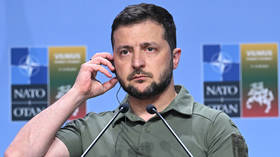Timofey Bordachev: Here’s why the US will almost certainly never allow Ukraine to join NATO
Kiev has to face up to some bad news – for the first time, NATO enlargement has become a threat to Washington itself

The Ukrainian crisis marks the first time in history that the United States has exposed itself to serious risks in defining the limits of its military presence in Europe. Any genuine move by Washington to invite Kiev into NATO would imply a willingness to enter into a direct military confrontation with Russia. A less risky option, many believe, would be to promise the Vladimir Zelensky regime some special bilateral guarantees.
The NATO military bloc was created on the basis of the real division of Europe into zones of influence between the US and the USSR after the Second World War. As a result of the greatest armed confrontation in the history of mankind, the bulk of European states lost forever the ability to determine fundamental issues of their national policy. These included, first and foremost, defense and the ability to form alliances with other countries. Europe was divided between the real winners of the conflict – Moscow and Washington. Only Austria, Ireland, Sweden, Finland and a small part of Switzerland were outside their zone of dominance.
Both of the great powers had an informal right to determine the internal order of the territories under its control. This was because the countries concerned had lost their sovereignty as such. Even France, which continued to demonstrate freethinking for several decades, had no doubt on whose side it would fight in the event of a new global conflict.
NATO was created in 1949 to formally deprive American allies of the ability to make their own foreign policy decisions and military doctrines. In this respect, the alliance was no different from the Warsaw Pact that had emerged in the USSR’s sphere of influence.
The relationship between the United States and other NATO countries has never been an alliance in the traditional sense. In the last century, classic alliances ceased to exist altogether – the gap in military capabilities between the nuclear superpowers and every other country in the world became too great.
A military alliance between relative equals is possible, as it was until the middle of the last century, but nuclear weapons have made this impossible. The former sovereign states of Europe became a territorial base from which the great powers could negotiate in peace and act in war. The creation of NATO and the subsequent accession of countries such as Greece, Turkey, Spain and West Germany to the alliance was a formalization of the boundaries of US dominance that the USSR had already agreed to in bilateral relations.
After the Soviet collapse, extending American rule to Moscow's former allies in Eastern Europe and even the Baltic republics was also not a policy that posed serious risks for Washington. Incidentally, this is why NATO has an informal rule of not admitting countries with unresolved territorial disputes with third states – the US has never been willing to occupy land whose ownership is disputed. NATO’s post-Cold War expansion was based on deception, with the US promising Moscow that it would not expand NATO to Russia’s borders. But, initially, Russia did not have the physical strength to resist. This meant that the US could occupy “unclaimed” states without the threat of immediate military conflict. The US approach to NATO remained true to the philosophy of the 1945 victors: there are no sovereign states, only controlled territories.
Once the decision was taken in Washington, it was only a matter of strategy to ensure that local governments made the “right” decisions. This was all the more so as the accession of new countries to NATO in the 1990s and 2000s was ‘packaged’ with the enlargement of the European Union. This gave local elites every reason to aspire to join the bloc, from which they expected tangible material benefits. For some – the Baltic states and Poland – membership in the club also provided the possibility of solving internal problems through an aggressive anti-Russian policy by fostering fear of the big neighbor to the east. In the Baltic states, the status of an American outpost was also used by elites to combat any local opposition from radical nationalists.
For the countries that joined the bloc, NATO became a guarantee of internal stability. Since the most important decisions for them were taken outside their national political systems, there was no reason for internal competition and no danger of serious destabilization.
Of course, no country is safe from minor internal political disturbances, such as those caused by a change of government – especially if the one in power is not liked by the US. But radical changes, which generally involve foreign policy issues, have become impossible.
In this sense, Western Europe increasingly resembles Latin America, where the quality of life of the population doesn’t have dramatic consequences for the elites. There, geographical proximity to the US has long been a reason for almost total American control. The only exceptions have been Cuba and, in recent decades, Venezuela. In Western Europe, because of Russia's proximity, this control is of a formal nature, which should in principle rule out any surprises.
Joining NATO is an exchange of state sovereignty for the indefinite retention of power by the ruling elite. This is the secret of every political regime's desire to join the bloc: it gives them the possibility of “immortality" in spite of any domestic or economic failures. The regimes in Eastern Europe and the Baltics immediately realized that they would not last long in power without being under Washington's control – the break with Moscow and the peripheral position of their countries promised them too many problems. And the reason Finland joined NATO is that the local elites no longer have confidence in their ability to hold power on their own.
For the United States itself, as we have seen, the expansion of its presence has never posed any serious threat or risk. At least until now. This is precisely what is being pointed out by those in America who are calling for a careful approach to be taken in response to the demands of the authorities in Kiev for membership. A call which is supported by some members of the bloc.
It is understood that a military clash between Moscow and NATO would mean global nuclear war. Nevertheless, back in the Soviet period, the US believed that any conflict with the USSR could be confined to Europe and would not involve direct attacks on each other’s territory. There is reason to believe that Moscow felt the same way during the Cold War.
NATO’s eastward expansion after the Cold War was a case of acquiring territories for which no one wanted to fight. However, in the situation of Ukraine, for the US is not a question of gaining territory, but rather of taking it from a rival power that wants to keep Washington out. This has never happened in the history of NATO, and one can understand those in Western Europe and the US who are calling for serious consideration of the likely consequences.
Inviting Kiev to join NATO could mean something entirely new for American foreign policy – a willingness to fight a peer adversary like Russia. Throughout their history, Americans have shied away from this, using other players as battering rams willing to sacrifice and suffer for American interests. This was the case in both the First and Second World Wars. The most likely scenario, therefore, is that the US will limit itself to promising to address the issue of Ukraine and NATO after the Kiev regime has resolved its problems with Russia in one way or another. In the meantime, it will only be promised some “special” terms on a bilateral basis.
https://www.rt.com/news/579613-us-never-allow-ukraine-join-nato/




0 Comments:
Post a Comment
Subscribe to Post Comments [Atom]
<< Home